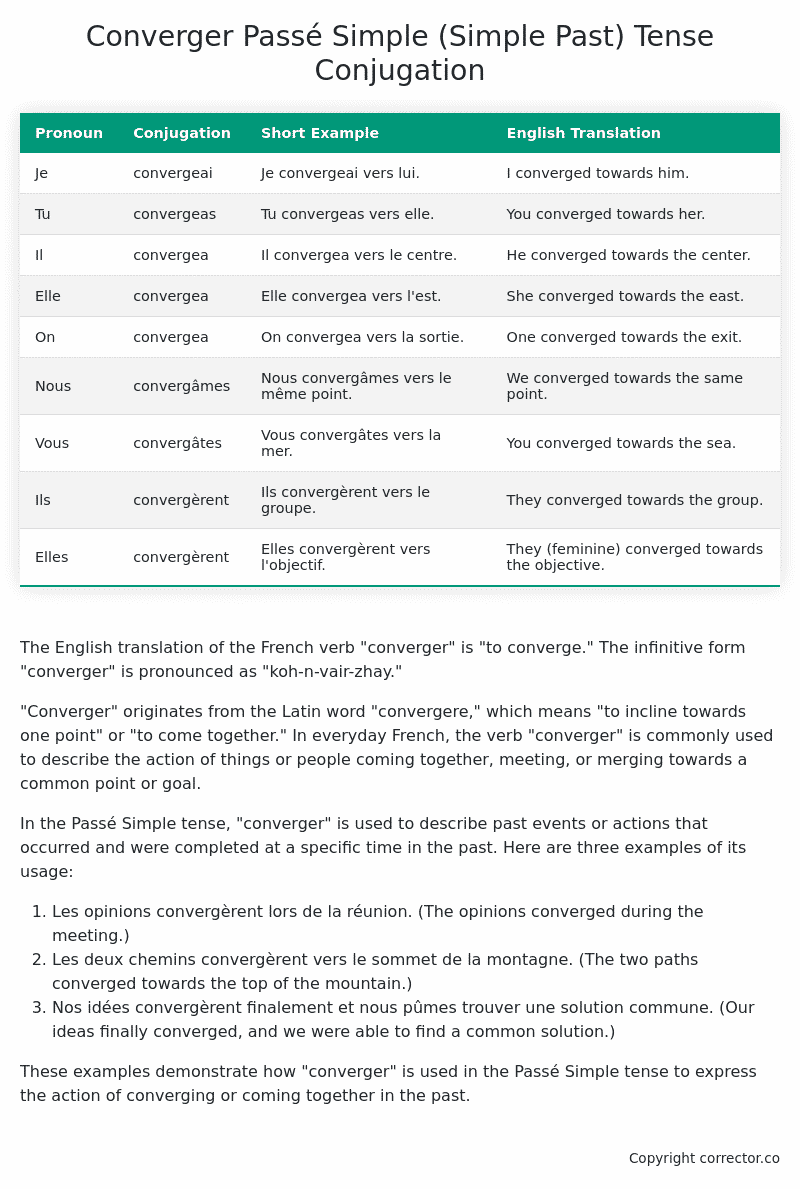Passé Simple (Simple Past) Tense Conjugation of the French Verb converger
Introduction to the verb converger
The English translation of the French verb “converger” is “to converge.” The infinitive form “converger” is pronounced as “koh-n-vair-zhay.”
“Converger” originates from the Latin word “convergere,” which means “to incline towards one point” or “to come together.” In everyday French, the verb “converger” is commonly used to describe the action of things or people coming together, meeting, or merging towards a common point or goal.
In the Passé Simple tense, “converger” is used to describe past events or actions that occurred and were completed at a specific time in the past. Here are three examples of its usage:
- Les opinions convergèrent lors de la réunion. (The opinions converged during the meeting.)
- Les deux chemins convergèrent vers le sommet de la montagne. (The two paths converged towards the top of the mountain.)
- Nos idées convergèrent finalement et nous pûmes trouver une solution commune. (Our ideas finally converged, and we were able to find a common solution.)
These examples demonstrate how “converger” is used in the Passé Simple tense to express the action of converging or coming together in the past.
Table of the Passé Simple (Simple Past) Tense Conjugation of converger
| Pronoun | Conjugation | Short Example | English Translation |
|---|---|---|---|
| Je | convergeai | Je convergeai vers lui. | I converged towards him. |
| Tu | convergeas | Tu convergeas vers elle. | You converged towards her. |
| Il | convergea | Il convergea vers le centre. | He converged towards the center. |
| Elle | convergea | Elle convergea vers l’est. | She converged towards the east. |
| On | convergea | On convergea vers la sortie. | One converged towards the exit. |
| Nous | convergâmes | Nous convergâmes vers le même point. | We converged towards the same point. |
| Vous | convergâtes | Vous convergâtes vers la mer. | You converged towards the sea. |
| Ils | convergèrent | Ils convergèrent vers le groupe. | They converged towards the group. |
| Elles | convergèrent | Elles convergèrent vers l’objectif. | They (feminine) converged towards the objective. |
Other Conjugations for Converger.
Le Present (Present Tense) Conjugation of the French Verb converger
Imparfait (Imperfect) Tense Conjugation of the French Verb converger
Passé Simple (Simple Past) Tense Conjugation of the French Verb converger (You’re reading it right now!)
Passé Composé (Present Perfect) Tense Conjugation of the French Verb converger
Futur Simple (Simple Future) Tense Conjugation of the French Verb converger
Futur Proche (Near Future) Tense Conjugation of the French Verb converger
Plus-que-parfait (Pluperfect) Tense Conjugation of the French Verb converger
Passé Antérieur (Past Anterior) Tense Conjugation of the French Verb converger
Futur Antérieur (Future Anterior) Tense Conjugation of the French Verb converger
Subjonctif Présent (Subjunctive Present) Tense Conjugation of the French Verb converger
Subjonctif Passé (Subjunctive Past) Tense Conjugation of the French Verb converger
Subjonctif Imparfait (Subjunctive Imperfect) Tense Conjugation of the French Verb converger
Subjonctif Plus-que-parfait (Subjunctive Pluperfect) Tense Conjugation of the French Verb converger
Conditionnel Présent (Conditional Present) Tense Conjugation of the French Verb converger
Conditionnel Passé (Conditional Past) Tense Conjugation of the French Verb converger
Conditionnel Passé II (Conditional Past II) Tense Conjugation of the French Verb converger
L’impératif Présent (Imperative Present) Tense Conjugation of the French Verb converger
L’impératif Passé (Imperative Past) Tense Conjugation of the French Verb converger
L’infinitif Présent (Infinitive Present) Tense Conjugation of the French Verb converger
L’infinitif Passé (Infinitive Past) Tense Conjugation of the French Verb converger
Le Participe Présent (Present Participle) Tense Conjugation of the French Verb converger
Le Participe Passé (Past Participle) Tense Conjugation of the French Verb converger
Struggling with French verbs or the language in general? Why not use our free French Grammar Checker – no registration required!
Get a FREE Download Study Sheet of this Conjugation 🔥
Simply right click the image below, click “save image” and get your free reference for the converger Passé Simple tense conjugation!

Converger – About the French Passé Simple (Simple Past) Tense
Formation
Usage
Narration
Historical Context
Interactions with other tenses
Passé Composé
Imparfait
Conditional and Subjunctive
Summary
I hope you enjoyed this article on the verb converger. Still in a learning mood? Check out another TOTALLY random French verb conjugation!


